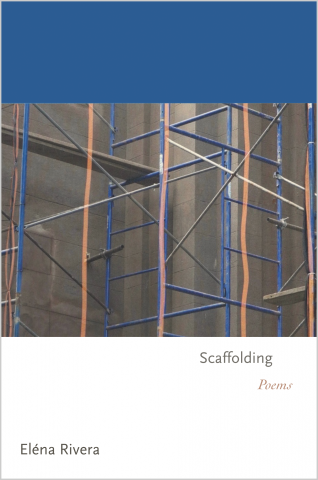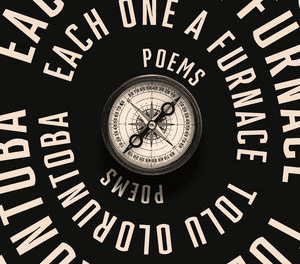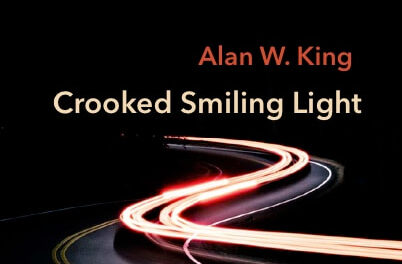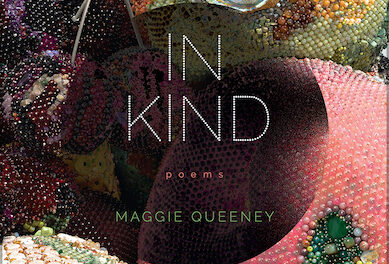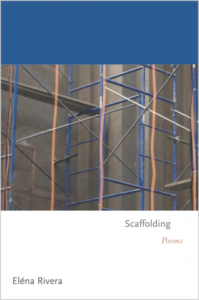 Editorial Assistant Ankit Basnet: Over the years, I have grown fond of reading book-length poems. And the projects that always draw me in are, unsurprisingly, sonnet sequences, often favored by contemporary American poets experimenting with poetic forms. The sonnet never goes out of vogue because it stands the test of time. Its shape is so familiar that poets find it anywhere and everywhere. No wonder Eléna Rivera can spot a sonnet cruising in the streets of New York. In the beginning of her extended sequence, Scaffolding (Princeton University Press, 2017), Rivera writes,
Editorial Assistant Ankit Basnet: Over the years, I have grown fond of reading book-length poems. And the projects that always draw me in are, unsurprisingly, sonnet sequences, often favored by contemporary American poets experimenting with poetic forms. The sonnet never goes out of vogue because it stands the test of time. Its shape is so familiar that poets find it anywhere and everywhere. No wonder Eléna Rivera can spot a sonnet cruising in the streets of New York. In the beginning of her extended sequence, Scaffolding (Princeton University Press, 2017), Rivera writes,
Dawn in the city, windows wide open—wham!
Slam! Screams! Now scaffolding confronts this hometown—
trash smashed, strollers, birds, doors opening/closing
The city of New York, the oblique subject of the book, teems with sonnets. It abounds in “subjects and effects / stilled only by the instant of a painting.” It is a maze of streets and subways, waiting to be discovered. Rivera’s book is then a tour of the city. And we come to know it through her sonnets, sung in a strange, melodious voice.
In Scaffolding, the city and the sonnet exert such an exhilarating presence that one is but compelled to feel tiny and trivial. “We in the big city in our huge smallness” are the figments of such a place. Rivera sings about its joys and sorrows, routine and madness, poverty and glamour in a poetic form small enough to contain the miniatures of everyday life.
Yet, the sonnet favors poets who are ambitious enough to risk experimentation and mark their presence in its tradition. Rivera has maintained this experimental commitment in many of her book-length projects, including Overture (Metambesen Books, 2014), Remembrance of Things Plastic (Little Red Leaves, 2010), Unknowne Land (Kelsey Street Press, 2000), and Wale; or The Corse (Leave Books, 1994). In Scaffolding, she continues to navigate the tradition in the sonnet form. Rivera says in an interview on the Princeton University Press blog, “The sonnet form is a kind of ‘scaffolding,’ a structure, for the substance and sounds of the poem, as is the hendecasyllable line. I also like the darker meaning of the word, ‘an elevated platform on which a criminal is executed’; there was something that felt dangerous about these poems, about what I was doing.” Scaffolding, then, is an obsession as much with the oddity of this structure as with the portrait of the metropolis constructed thorough it.
This passionate engagement is mostly visible in the lines and their arrangement in the sonnets. In the first stanza of “AUG. 14TH,” Rivera writes,
The form carries a one-way conversation,
site of separation brought into relief
A relationship between sonnet and “house”
the I that tried to run away, walls of snow,
and how invisible the girl felt, small, bold
As Rivera shifts the lines within the stanzaic structure, adding a line to the above quatrain for instance, her voice twists and her sights turn to that which astonishes her. The extra-syllable endings of her lines tilt the balance ever so slightly. And we are reminded that the rhythm of poetry and the rhythm of a city come to us in lines and fragments.
Scaffolding is a profound meditation on the intersection of these two kinds of fragments—the poetic line and the quotidian. It’s a book about falling in love with a city. Yet, she reminds us that one has to “grasp the pattern of the fall / So discomforting knowing there was no love.” Love and loss, memory and forgetfulness, presence and absence—these are the recurring themes of the book. And she captures them in the portraits of the city’s residents: “In the mirror your self-portrait your figure / your ordinary every day face stares back / The subject lies in the marks of a paintbrush.” In such intensely personal moments, Rivera stages the encounters that dazzle every city dweller. One cannot but fall in love with the book, and its city, that Rivera has given us.
Ankit Basnet is currently a PhD student in literary and cultural studies at the University of Cincinnati, where he studies modern and contemporary American poetry and performs research on the Elliston audio archive at the Digital Scholarship Center.

